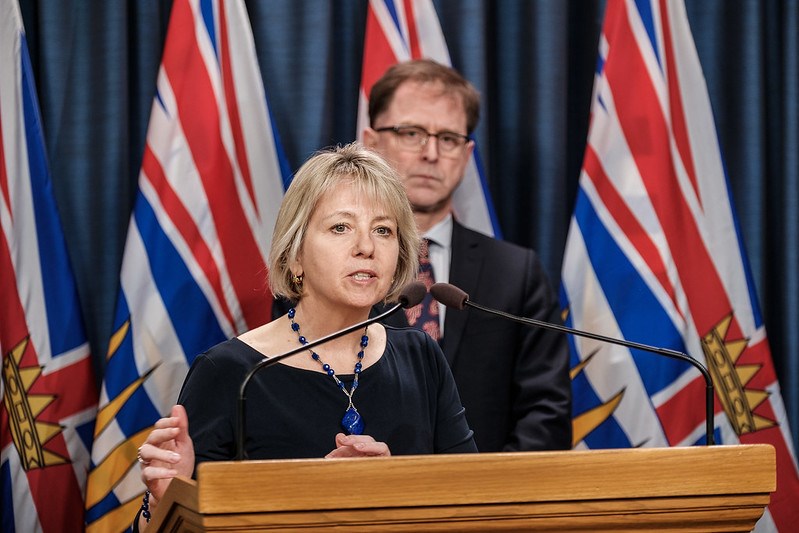After what she called “a challenging weekend,” provincial health officer Dr. Bonnie Henry said in her March 16 update that B.C. now has 103 cases of COVID-19, an increase of 30, with six in hospital and three new deaths – all at the Lynn Valley Care Centre, where the first death from the virus was recorded.
Five patients are now considered fully recovered and several others are well on the way to recovery.
“The situation is escalating around us and here in British Columbia as well,” Henry said. “And there are things that we need to do now to take action to protect our citizens, our communities and our families.”
Henry said the new cases are in the Vancouver Coastal Health region, Fraser Health, Vancouver Island and Interior Health.
She also said more cases have been traced to attendees at a large dental conference in Vancouver on March 6 and 7. “At least four, and possibly more, of our cases are related to that dental conference,” she said. “That is very concerning to me. We also know that cases have been identified from that conference in other provinces… Anyone who was at that conference needs to self-isolate immediately. They should not be at work, they should not be at school, they should not be around others.”
Henry and Health Minister Adrian Dix also announced the prohibition on public events of more than 250 people is now being tightened to events of more than 50 people.
Casinos across B.C. are now being closed, as well as ski resorts including Whistler.
Henry also said the province is expecting word from Ottawa that BC Ferries will be granted an exemption “for the next coming weeks” on having to leave vehicles parked on the lower decks of the ferries. “That’s a measure we’ve heard from the federal government will be implemented soon – that’s good news.”
Just before Henry and Dix held their briefing, Prime Minister Justin Trudeau announced that Canada will restrict entry to the country to returning Canadian citizens or permanent residents only and international flights would be allowed only at YVR, Calgary International Airport, Pearson International Airport in Toronto and Montreal’s Trudeau International Airport.
U.S. citizens will be exempt and the land border with the U.S. will remain open – a move that Dix said he was urging the prime minister to reconsider, especially in light of the seriousness of the COVID-19 outbreak in Washington State. “We remain concerned that access from visitors from the United States continues to be allowed… It’s our strong view and it’s our strong message that visitors from the United States not come to British Columbia.”
Dix and Henry also announced measures to free up hospital resources to better cope with a surge in patients that might require hospitalization. All hospitals have been instructed to move to “outbreak response phase 2,” which means performing only urgent and emergency procedures and postponing all non-urgent scheduled surgeries. Dix estimated thousands of surgeries will be cancelled to free up “hundreds and hundreds and hundreds” of hospital beds.
Lions Gate Hospital will be put on outbreak response phase three – accepting only emergency patients.
To free up primary care doctors, the ministry has instructed pharmacists to renew existing prescriptions without requiring a note from a doctor. “This will save time in doctors’ offices and ensure doctors can focus on urgent matters.”
People who believe they may have COVID-19 symptoms have been directed to call 811, which also handles general health inquiries, but Dix said the province is now activating a dedicated number: 1-888-COVID19 (or by text 604 630 0300).
“We are consulting with education stakeholders today to discuss potential recommendations for school operations following spring break,” Dix said. “We expect a formal announcement on this tomorrow (March 17).”
“The challenges in the next four weeks dwarf the challenges in the last four weeks,” Dix said.
All the province’s long-term care homes have also been ordered to impose visitor restrictions, which Henry said will mean the risk that seniors will become less connected to others in the community.
“I’m asking for people to step up and help us communicate with our seniors whether they’re in their own home or whether the residents of long-term care homes or assisted living facilities [and] for us to come together as a community to connect on a daily basis at least with the people in our community who are in isolation and aren’t able to have visitors.”



